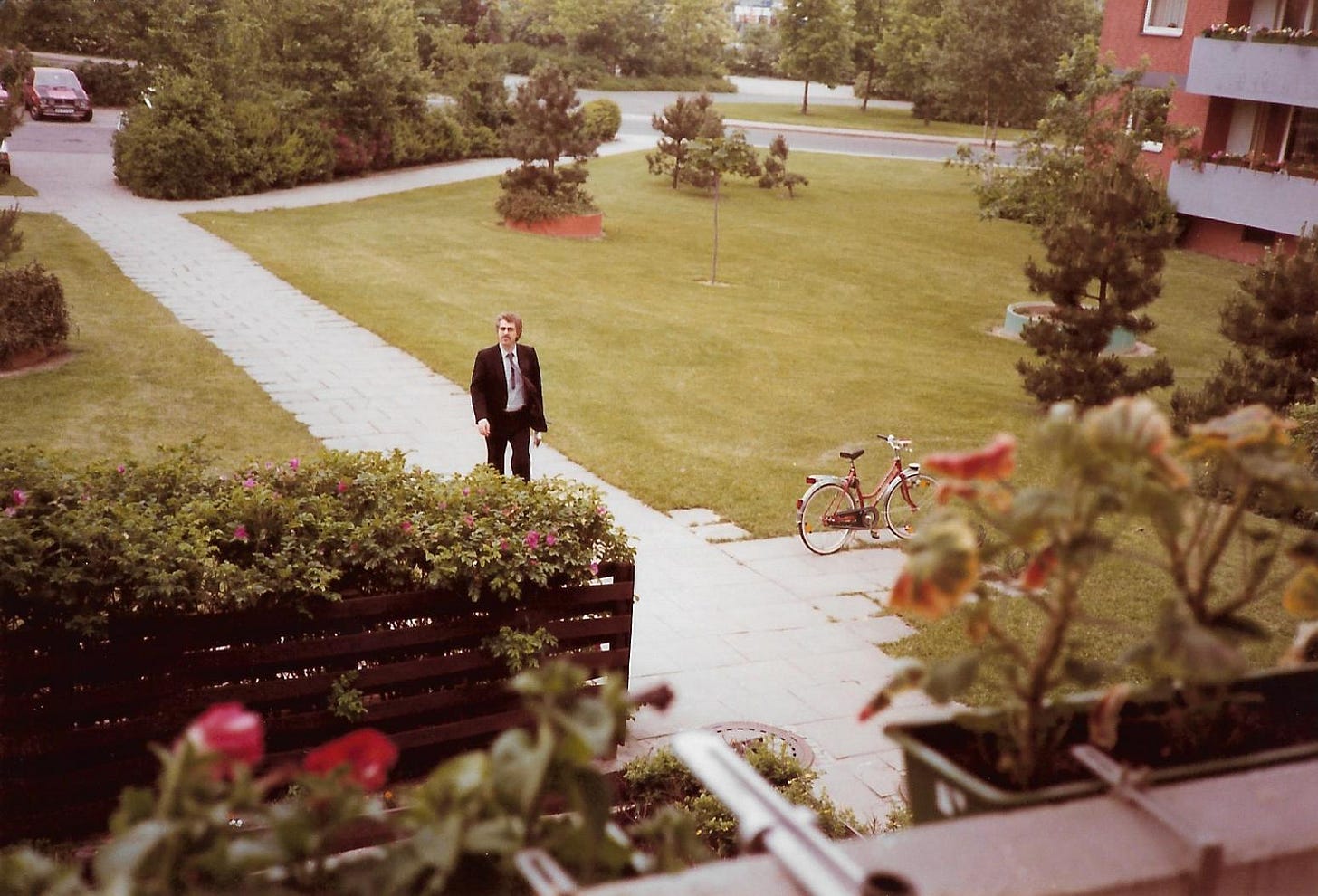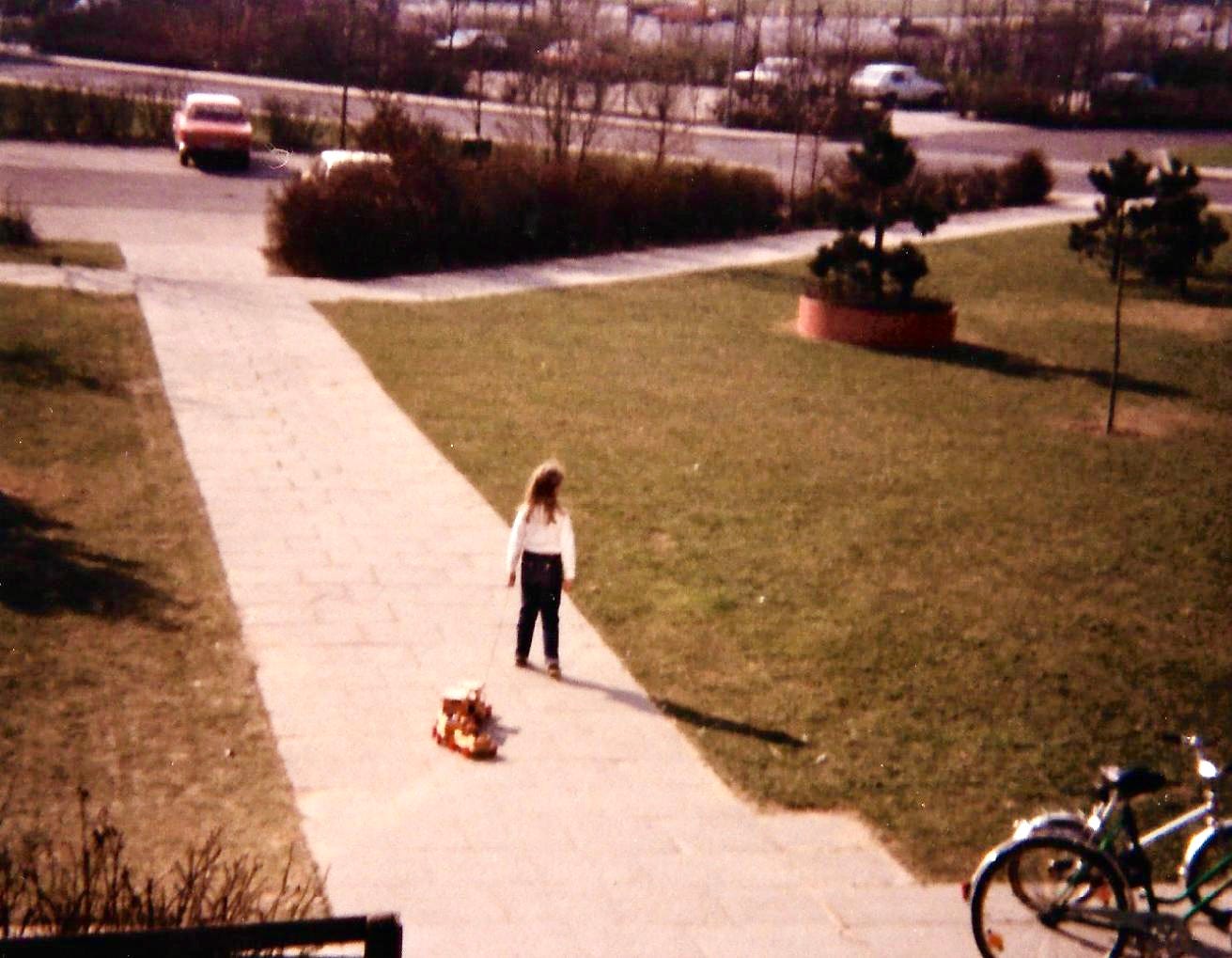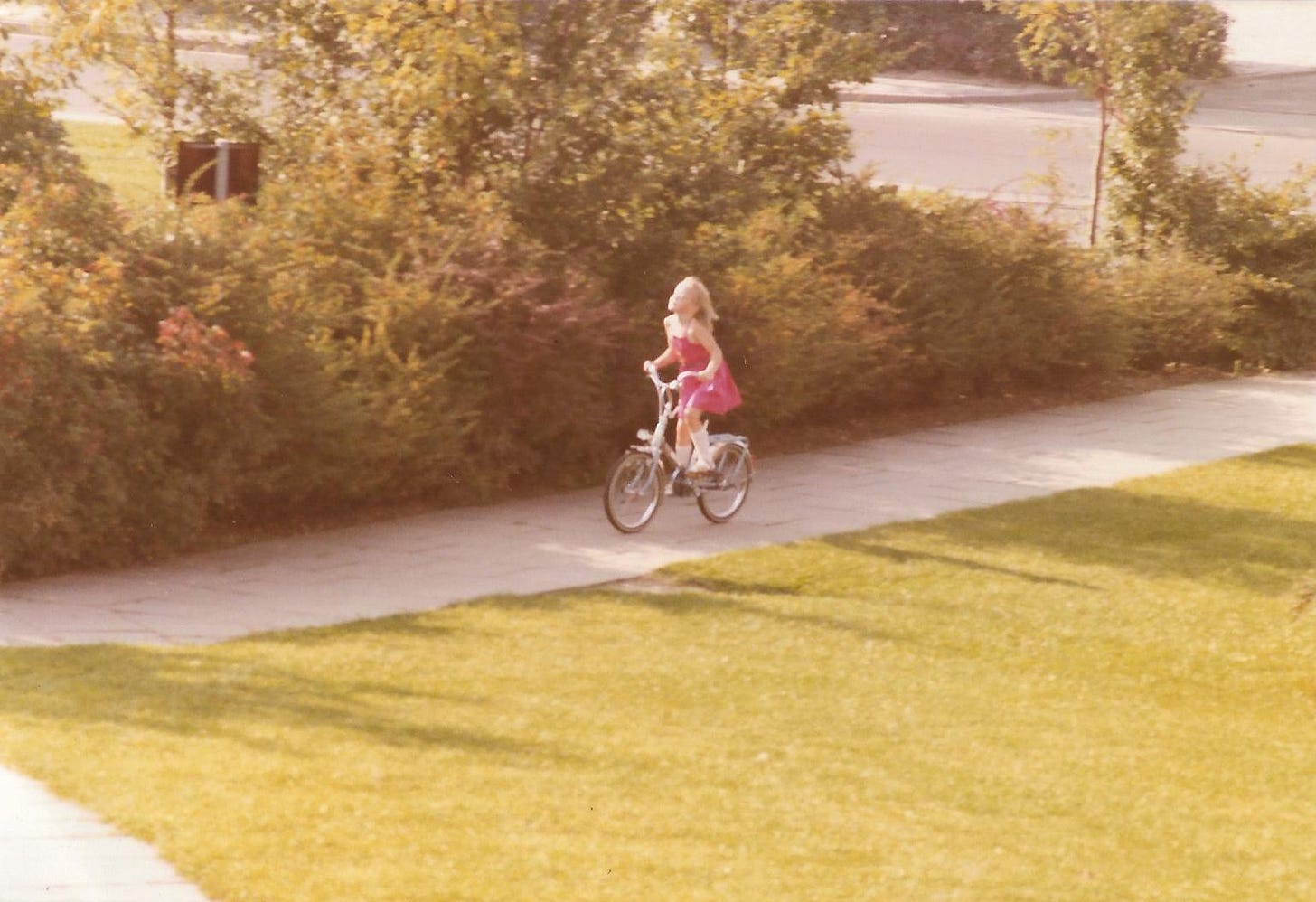Nostalgia in Photography
and the fascination I have with old photos
The other day I sent my brother a message asking him if he had any photographs of the house or neighborhood we had been growing up in. Shortly after, he sent me this photo above and a few other snapshots. I don’t know whether one of my brothers, my mother or I had taken that photograph, but just by looking at it, I was instantly transported forty years in time back onto the balcony of our apartment where that photo had been made.
The scene in the photograph was all too familiar: my father coming home after a long day working as a salesman. I don’t know how many times I have been looking out of the window in my room or standing on the balcony, waiting for my Dad to return home from work, watching him as he parked the car and eventually walking up the path from the parking lot up to the apartment building. My Mom and I would set up the table for dinner where the five of us would gather, eat dinner and share what we were up to during the day. In the summertime, my Dad and I would sometimes take our bicycles for a little ride. In the wintertime, I often would cuddle up with him on the couch and watch TV until it was time for me to go to bed.
I had been living in that neighbourhood for most of my childhood and teenage years. We moved there when I was four and stayed there until I was eighteen years old. Many firsts happened there for me: my first day of school, my first bicycle ride, my first pet (a budgie named Bubu), my first boyfriend, my first cigarette (which I thought tasted disgusting), my first kiss, my first breakup. The list goes on.
The more I looked at these photographs, the more I was being pulled back into the past, and the more memories kept popping up in my head. I felt very nostalgic, and over the next couple of days, this feeling kept lingering over me like a cloud.
I started to wonder why photographs have such an effect on me and I began to read more about the concept of nostalgia.
The term "nostalgia" has its origins in the Greek language. It is derived from the words nostos, meaning return home, and algos, meaning pain or ache. The dictionary describes it as a “wistful or excessively sentimental yearning for return to or of some past period or irrecoverable condition” or “the state of being homesick”.1
I learned that in the 17th and 18th centuries, nostalgia was seen as a medical condition that affected individuals, particularly soldiers, who were sent away to fight for their home country.
The Swiss physician Johannes Hofer studied this phenomenon extensively and gave it the name Nostalgia. Described symptoms were such as melancholy, fatigue, insomnia or the loss of appetite caused not by a physical disturbance but an intense yearning for people’s native homeland.
By the 19th century, the understanding of nostalgia began to change. Professionals realized that many of the described symptoms may have correlated with nostalgia but have not caused them. Nostalgia was no longer considered a disease but was seen as a normal, even healthy emotional experience every person could experience. And despite the fact that nostalgia can include feelings of sadness and loss, nostalgia doesn’t generally put people in a negative mood. Research shows, that nostalgia can even boost mental well-being and help increase people’s self-esteem and social belonging.2
It makes sense to me why I enjoy looking at old photos so much. Only a few other things have a similar effect on me: sometimes a certain food from my childhood, an old movie or a song, but most often it’s old photographs. And most interesting is, it doesn’t necessarily have to be a photograph from my own past.
I remember my parents had this one box full of old photographs. It was a cardboard box, covered with faux leather. When I was in my twenties, every Christmas I would ask my Mom to get out this box and the whole family would sit together and look at these old photographs. Some of the photos were so old, that even my parents wouldn’t recall who those people were, what they were doing or where the photos was made. But that didn't make them lose their magic. Their clothing and hairstyles, the food, the automobiles, the interior design of their houses - all looked strange and yet familiar.
And although these photographs were documents from other people’s lives, holding their precious memories, not mine, they still evoked similar feelings of happiness, longing and wistfulness in me. It is like they serve as a collective memory and help me to connect with my own past and recall my own memories and experiences.
“As a medium that instantly captures and preserves the present as it transforms into the past, it could be argued that photography inherently possesses varying degrees of nostalgia, both on the part of its viewers and its practitioners. Furthermore, as a physical object with a long and diverse history, technological trajectory, cultural presence and social importance, the photograph itself carries with it the potential to both contain and evoke nostalgia.” - Aaron Schuman3
Photography as Aaron Schuman points out so perfectly, is a powerful medium for triggering as well as preserving nostalgia. Photography allows us to connect with the past. It lets us revisit memories, and appreciate the changes that have occurred over time. It reminds us where we came from and what we have accomplished ever since. Making and sharing photographs could therefore be seen as a human need to reminisce and feel a connection to our personal and collective histories.
That’s it from me today.
Thank you for being here and for reading this week’s newsletter.
X,
Susanne
If you enjoyed this weeks topic, I would love to hear from you. Please share your thoughts in the comments with me.
If you are enjoying My Morning Muse, you can support me by subscribing to my newsletter (or even becoming a paid subscriber), liking the post, and sharing it with friends. It would mean the world to me! ❤️
https://www.merriam-webster.com/dictionary/nostalgia
https://www.youtube.com/redirect?event=video_description&redir_token=QUFFLUhqa0hNN0hlR2tVTzg1ekZqN292VTVmVGY2M2Q1Z3xBQ3Jtc0trS1djeHdGQUZRUHBaSXA3eXdnQ1p2NjFFQzlQNldWa1NyV3Q0d0ZCWjVnbThOQUZKZzdjeGdwWE9hRzI4ZjF2bHVZa0JINGdNV1luQ0VKOHFsRUZqaEtGNTE5VWJxVDVQVlZMMGZIWi1rSk9QaFp6MA&q=http%3A%2F%2Fed.ted.com%2Flessons%2Fwhy-do-we-feel-nostalgia-clay-routledge&v=WiTgn5QH_HU
https://www.issp.lv/en/education/workshops/aesthetics-of-nostalgia





So kind of you to share my post! Thank you!
I love this topic and especially your callout on the overall evolution and acceptance for what nostalgia serves. I wrote a short newsletter asking the question about what evolutionary purpose nostalgia serves. Found some interesting research. Looking forward to reading more. https://open.substack.com/pub/adlcworld/p/does-nostalgia-serve-an-evolutionary?r=2j7pf3&utm_medium=ios&utm_campaign=post